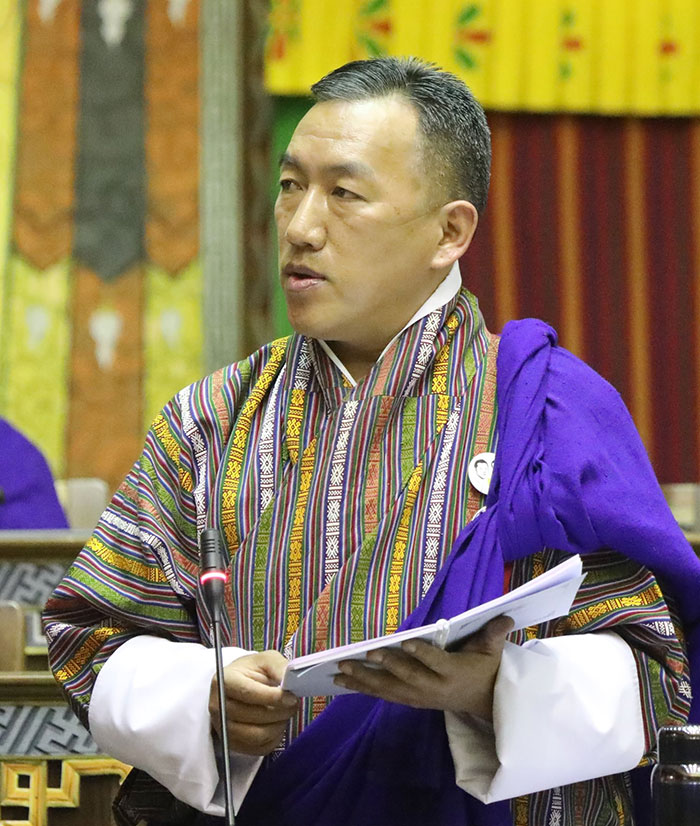
The amendment violates Article 24,26 and 27 of the Constitution: OL Dorji Wangdi
Entitlement and Service Conditions Bill back in NC
Yangchen C Rinzin
All eyes and ears will be on the National Council (NC) as the Entitlement and Service Conditions (Amendments) Bill for the Holders, Members and Commissioners of Constitutional offices is sent to the NC for re-deliberations.
Centre to the Bill is the issue of the constitutionality of a section which requires members and commissioners to resign after the five-year term or upon reaching 65.
The National Assembly (NA) endorsed the Bill last week where Chapter 2, section 4 was amended. Commissioners and members of constitutional offices will not have to resign from the civil service on their appointment or after completing the five-year tenure, according to the amended section.
Will the Bill sail through easily at the NC?
In 2014, the NA proposed to amend the same section. In the following Parliament session, in 2015, the NC did not accept the NA’s proposal. The House rather proposed members and commissioners to be re-appointed, subject to a maximum second term, which the NA had endorsed then.
The same proposal originated in the NC this year where the House already endorsed the amendment.
While the NA endorsed the amendment with 28 ‘Yes’ votes and 10 ‘No’ votes on December 5, the debate of the constitutionality still remains.
At the NA, members, especially from the Opposition Party, repeatedly pointed out that the amendment is violating Article 31 of the Constitution, which mentions that the holders of constitutional post shall not be reappointed.
Although many members ,including those of the Social and Cultural Committee of the NA, who submitted the Bill for deliberation stressed that it would be a violation to the Constitution, the NA endorsed the Bill
Did NA overlook the Constitution?
Members of the Constitution drafting committee Kuensel talked to said that doing away of compulsory resignation is not in line with Article 31, because members and commissioners are not constitutional position holders.
Article 31 clearly states that holders of constitutional offices are the Chief Justice (CJ) of Bhutan and the Drangpons of Supreme Court, CJ and the drangpons of the high court, Chief Election Commissioner, Auditor General, chairperson of Royal Civil Service Commission (RCSC) and Anti-Corruption Commission (ACC).
Article 31(section 4) of the Constitution states that holders of the constitutional offices shall not be eligible for re-appointment. However, commissioners and members may be re-appointed or be elevated to the post of chairperson.
“So, this has no direct violation to the Constitution,” a member said. “Position holders cannot be re-appointed, it does not talk about the members and commissioners, who are not position holders.”
The former Supreme Court Chief Justice, Sonam Tobgye in his interpretation of the Constitution of the Kingdom of Bhutan, states that resignation of constitutional post holders is compulsory because the “security of tenure ensures independence and re-appointment may threaten impartiality.”
Another member of the Constitution drafting committee said that since the Entitlement Act was passed by the two Houses before, the Parliament had the prerogative to discuss and amend Section 4 of the Act.
Members of NC’s Good Governance committee who proposed the amendment said that what they recommended was as per the Constitution. “We have referred to the Constitution before the amendment was proposed,” said a member. “The reason we proposed was because it was observed that they have to resign at a young age. The amendment was to make a provision to keep those capable members and commissioners back.”
Article 24, 26 and 27
A member from the social and cultural committee of NA said that Article 31 talks only about the position holders, however, Section 3 of each Article on constitutional offices clearly mentions that the chairperson and members of the constitutional offices shall be five years.
“This is in direct contradiction to the Constitution,” he said.
The term of office of the chairperson and members of Anti-Corruption Commission shall be five years or until attaining the age of 60 years, whichever is earlier. The same applies to holders of constitutional offices, members and commissioners of RCSC and ECB.
Opposition Leader Dorji Wangdi said that the amendment violates Article 24, 26 and 27 of the Constitution.
On Article 26, RCSC, former Chief Justice Sonam Tobgye stated (in his book) that the Constitution holds that tenure and age limitations are important in the RCSC because they are in the interest of the nation to ensure professionalism and to avoid vested interests.
On the tenure of ACC commissioners, he stated, “Many administrative and constitutional reforms advocate a tenure system to ensure long-term stability,” he stated.
However, the Constitution drafting committee member said that the amendment could not be construed as a direct violation of the Constitution because it has mentioned that the term shall be five years, but is silent on resignation.
“Probably the House might have decided to do away because the resignation is in the Act and not in the Constitution. If the House had decided not to make resignation compulsory for position holders, then it would contradict the Constitution because the Constitution is clear on the position holders.”

